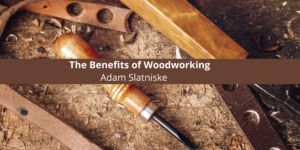Adam Slatniske Discusses the Benefits of Woodworking


The art of woodworking has been cultivated and refined for centuries. Although it fell out of fashion somewhat with the advent of factory-generated furniture and particleboard projects, it’s a skill that more and more people are becoming interested in. From small whittling projects to solid oak dining tables, woodworking comes in many different forms. Alongside the beautiful fruits of your labor, woodworking also has a myriad of physical and psychological health benefits. Adam Slatniske, a local dentist and amateur woodworker, says that his years of crafting have changed his life for the better.
Woodworking Reduces Stress Says Adam Slatniske
Like many other crafting and creative hobbies, woodworking can help reduce stress and anxiety. Working with your hands and focusing on the task at hand narrows your focus, allowing your mind to let go of the thoughts about your busy day or your everyday responsibilities, says Adam Slatniske. This is a mindfulness practice known as “flow” in sociology and psychology.
People who experience “flow” – a state of mind where a person becomes fully immersed in an activity – have been found to have higher energy, more feelings of connection with those around them, and deeper satisfaction with their life overall. Letting yourself sink into a task you enjoy chases all your problems away, says Adam Slatniske.
Woodworking Helps You Build Muscle Says Adam Slatniske
It’s common knowledge at this point that sitting all day is terrible for your health. Woodworking is an excellent remedy to the side effects of a sedentary lifestyle because it requires you to be active. You have to stand, move, stretch, bend – not to mention lift your wood, tools, and projects! Depending on the size of your projects and the density of the wood you are using, says Adam Slatniske, you could start building some serious strength in your arms and core muscles.
Even smaller-scale projects like whittling require a certain amount of tension and endurance from your arm muscles. No matter what type of project you’re working on, it’s better for you than typing or staring at a screen.
Woodworking Improves Your Math Skills Says Adam Slatniske
This is one of the more surprising benefits of woodworking, says Adam Slatniske, but he swears that his math skills have improved significantly as a result of his woodworking hobby. “Measure twice, cut once” is a common saying for a reason. You have to be incredibly exact when you’re working with pieces of wood – once you make that cut or start carving, you can’t go back. And try making something to scale! The fractions have to be precise to keep everything to scale.
